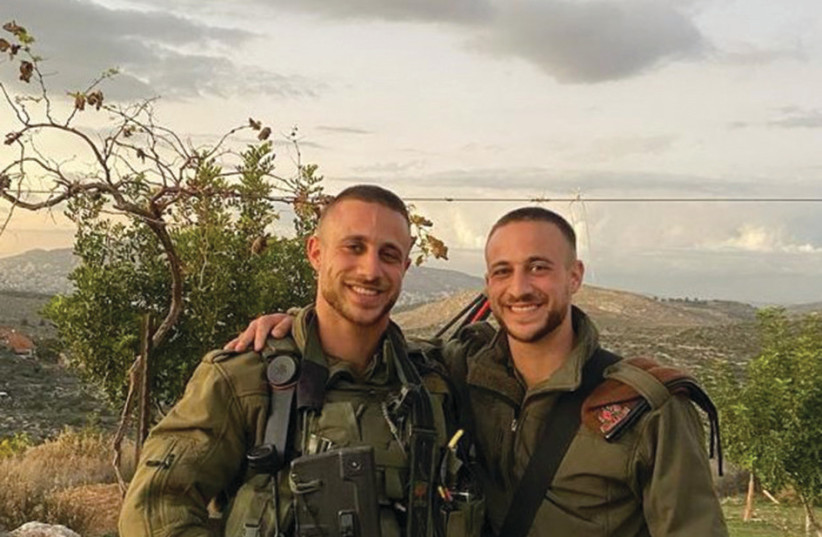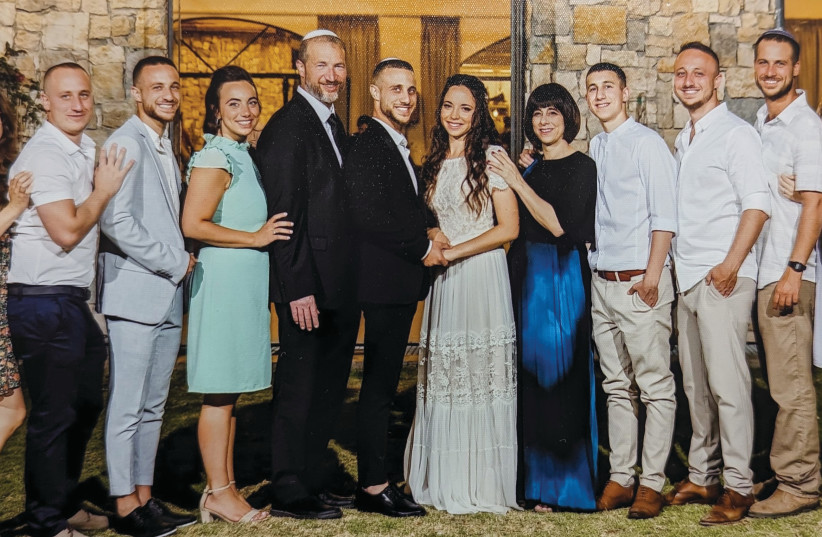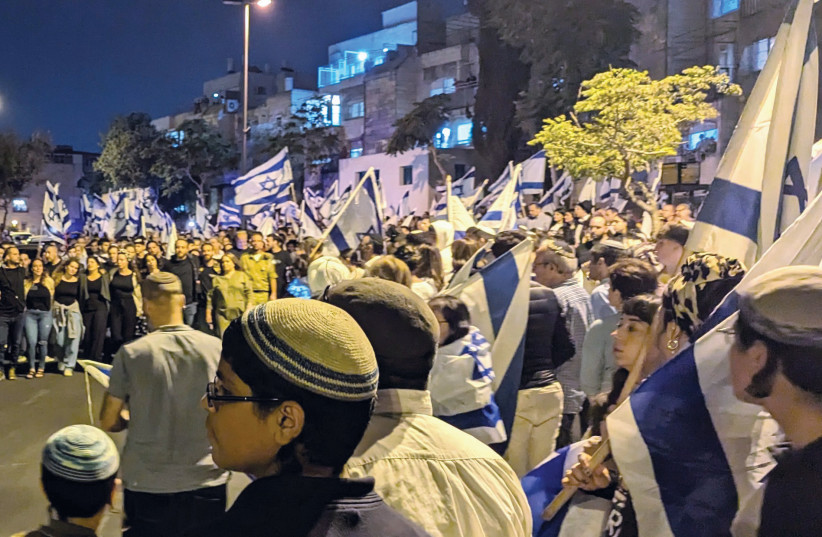On the first night of the war, the commander of a unit tasked with locating bodies is assigned to Kibbutz Alumim. He notices that on the ridge of a ditch lies a body with a burnt small firearm, surrounded by four dead terrorists. He says to his soldiers, “Here lies a holy person who came to save Kibbutz Alumim. Let us recite Psalms in his honor.” Next to the body he notices a watch, a ring, and a policeman’s cap.
The seven children of Shmuel and Tali Slotki grew up on a diet of Zionism, deep commitment to land, nation and family. The assumption of responsibility for people in distress is embedded as deep as DNA.
Both parents are role models. Talia is a senior and veteran nurse at Jerusalem’s Shaare Zedek Medical Center, currently serving as the hospital’s pain management coordinator. Among other things, Rabbi Shmuel is a revered communal rabbi with a quiet charisma and the ability to deliver complex sermons with profound insight. A judge in an army conversion court and CEO of the Organization of Orthodox Synagogues, he is a giant Torah scholar and a giant of a man. The couple traveled to Cleveland as emissaries for the Torah Mitzion organization, and since then Shmuel has held positions on Kibbutz Ein Hanatziv and in Jerusalem’s Ramot.
Noam Slotki, 31, was not a run-of-the-mill young man. To describe him as mischievous as a juvenile would be an understatement. An energetic youngster with ADHD, Noam did not stop moving for a minute. He was inclined to perilous pranks, way beyond the average kid’s tolerance of danger. He did not do well in regular school frameworks, eventually decided that the regular matriculation certificate was irrelevant, and enlisted in the army instead.
Assigned to the Egoz commando unit, he was an outstanding soldier, only to be released from the unit for one too many disciplinary infractions. He was placed in the regular units, where he became a combat medic, rising to commander in the reserves. Just recently he served for 30 days with his unit in Samaria.

Noam’s fighting prowess was honed when, after his IDF service, he worked in the Defense Ministry and, defying his previous academic record, simultaneously earned a first degree in Middle Eastern studies and learned Arabic. He then took a further academic step, earning a master’s degree in economics and business administration and studying actuarial sciences at Ben-Gurion University. Impressing the management at Checkpoint, he was employed there as a business data analyst.
Ever the multitasker, Noam lived in Beersheba, worked in Tel Aviv, studied, and together with his wife, Adi, raised their son, Netta Yehuda, who was born just 16 months ago. His paternal grandmother, Hadassah, remembers how Noam would travel to Tel Aviv by train, ride on a scooter to his workplace, and occasionally pop in to visit her and grandfather Shlomo on his way home, despite his hectic schedule. He also found time to keep in shape, working out in the gym and running long distances. Behavioral sciences was just one example of the range of his curiosity.
Yishai Slotki, 24, and his identical twin, Yonatan, were born while the Slotkis were on Kibbutz Ein Hanatziv. They served together in the Golani Reconnaissance Unit, supporting and encouraging each other. He, too, suffered from ADHD, and hopped from school to school. Yet he was never disheartened, and developed special friendships wherever he went. And he, too, had to leave the unit because of mischief, and moved to the battalion. Yishai had a heart of gold and a gaggle of good friends. When their friend David Ochana died of an allergic attack, he and Yonatan took it upon themselves to support the Ochana family, phoning and visiting them constantly.
Yishai married Avia, and they had a daughter, Be’eri Shachar, just two months ago. The choice of that name may not have been prophetic but came to symbolize the events that followed shortly thereafter.
The start of the war
BY DESIGN, Noam, Yishai, and their sister Shifra live in very close proximity in Beersheba. When the sirens sound early on that awful Simchat Torah morning, Yishai and family step out to the stairwell, where they meet neighbors who inform them that a huge Hamas force had attacked settlements and that there is no army presence to defend them. Yishai immediately returns to their apartment, grabs his pistol, and accompanies Avia and Be’eri Shachar to Noam and Adi’s apartment so that they would be together. Then he heads out in his car.
Noam, too, sets out in his car, on the same road with the same goal of saving Jewish lives. The alacrity of their response is a function of their shared value system. They understand the complicated logistics involved in getting the fighting forces to first engage the enemy, and that the consequence of the delayed response would mean further death to their fellow Jews.

Noam calls Yishai on the way, and they agree to travel together. Yishai waits for Noam, who picks him up. As they travel in a northwesterly direction on Highway 25, drivers fleeing from the mayhem are flashing their headlights, warning them of the danger ahead, indicating that they should turn around. But these young men will not be daunted. At a fork in the road, they are faced with a choice between traveling north to Sderot or west toward the smaller farming settlements. While we cannot be sure, they may have thought that Sderot was probably better defended. In any event, they continue west on the road that leads almost directly to Kibbutz Alumim.
Footage from security cameras at the main gate partly reveals the events that unfold. Noam and Yishai are once again exposed to a clear sign of the mortal danger. As they drive up to the gate, they are confronted by the sight of eight vehicles, all riddled with bullets and burnt. An RPG blows up another one as they park the car. There are approximately 30 terrorists present. As they jump out of their car, a hail of bullets greets them. They dive into a ditch, and for a minute or two they plan their next move. The last picture visible from the cameras are of the Slotki boys emerging from the ditch.
At Alumim that day, 16 Thai and Nepalese workers are killed, six wounded, and eight taken hostage. One other soldier is killed. Through the heroism of the local emergency squad, Noam and Yishai Slotki, and the army units that arrive later, 500 residents are spared murder, torture, abduction, and rape.
The actions that day of oldest brother Auri, 32, are also driven by the same family mindset. He is staying with his parents-in-law in Emek Hefer when he hears of his brothers’ actions and their last known location from Noam’s wife, who has tracked Noam’s phone to Alumim. Auri heads down south. His first stop is Barzilai Medical Center, where he searches for his brothers among the wounded. Not finding them there, he heads toward Alumim, he, too, armed with just a pistol. At a checkpoint on the way, he is stopped by soldiers, but the position is shot at by terrorists. In the confusion, Auri evades the barrier and continues toward Alumim, disregarding the danger.
Arriving there after nightfall, he is confronted by a scene of chaos and destruction. With just the flashlight of his mobile phone in hand, he finds Noam’s car. Nearby there is a mound of bodies, but his brothers are not among them. There are bodies also in a nearby ditch, but a burning vehicle has caused a fire, and it is not possible to identify them. However, he sees a metal watch gleaming in the darkness, and while he cannot be certain, it looks familiar.
Understanding that there is no more he can do there, he leaves the scene and heads directly for the North, where he has been called to join his reserve unit. On the way, he speaks to his father and says that he also noticed a police cap in the ditch. Rabbi Shmuel’s fears are compounded because, just a month before, Yishai had mentioned to him that in the course of his security duties at work, he wore a police cap so that he would not be mistaken for a terrorist. It is apparent to the family that the boys have fallen in battle.
Fates of their sons
THE SLOTKIS were asked if they would prefer to be informed of the fates of their sons individually or once both were determined. They opted for the latter.

Rabbi Shmuel serves in the army as a commander of a unit in charge of removing fallen soldiers from the battlefield and, via identification, bringing them to honorable burials. During those days of waiting, that is exactly what he did. One of the difficulties he describes was separating thousands of terrorists’ bodies from Israelis. “The terrorists took off their armored vests and uniforms and forced them onto Israeli hostages so that helicopter pilots and other Israeli forces combing the area would mistake the hostages for terrorists,” he explains.
Noam had been identified almost immediately; but due to a bureaucratic blunder, and despite his watch, wedding ring, and police cap found on site, Yishai’s death was only confirmed five agonizing days later when DNA was taken from twin brother Yonatan, who had returned from an overseas trip.
A huge throng gathered outside the Slotki home in Ramot on the evening of the funeral. Arm in arm, the family emerged and walked together, followed by the flag- and poster-bearing crowd, their sorrow and empathy piercing the respectful silence. Rabbi Shmuel noted the wide range of people from all sectors of society who came to express their sympathy and solidarity. “They were there together, united, without partitions, neither physical nor spiritual.”
At the funeral on Mount Herzl, the family requested that the thousands gathered sing “Hatikvah,” as well as “Kol Ha’olam Kulo,” (“The whole world is a very narrow bridge...”). Rabbi Shmuel explained, “We did not want the funeral to be depressing and debilitating. There are so many bereaved families, and we are at war. Our hinterland needs to be strong in order for our soldiers to be victorious. Therefore, it was important to us that the deaths of our sons should not be a cause for dejection.
“Rather, their bravery and valor should lift spirits and especially be a catalyst for unity. Thus we chose songs that, on one hand, reflect our deep belief and the confidence that we have in the path of our people; and, on the other, are beloved by all segments of our society.”
The sublime power of the quiet singing that rose from all corners of Mount Herzl that late night encompassed the family and the thousands in attendance.
Yishai’s twin, Yonatan, noted that, without diminishing their heroism in any way, what his brothers did was not surprising. It reflected the sense of individual responsibility that was integral to their upbringing. After he landed at Ben-Gurion Airport, and while his brothers were still missing in action, he returned home to see his family and immediately traveled north to lead his special unit.
After the shiva period, Rabbi Shmuel and the three eligible sons – Auri, Aviah (29), and Yonatan – were all back in uniform, returning to their units. Shifra (26) went back to her work as a nurse at Soroka Medical Center, which is bearing the brunt of the war’s casualties, and Tzviki (18) to his pre-army preparatory course. And Tali returned to her work in pain management.
One of the mantras often mumbled to mourners is not to remember the deceased in their last days but rather to remember the times of their good health, which reflect the true nature of their lives. In the case of Noam and Yishai Slotki, their last moments are a perfect image of the deep, enduring significance of these two blessed, majestic young men. ■
Rabbi Shmuel Slotki eulogized Noam and Yishai at their funeral: “Beloved sons, with great sorrow we have brought you to burial, but with our heads held high and with great pride in the way you chose to act last Shabbat, which revealed your personalities and characters. You were privileged to act at a key moment for change.
“Instead of rivalry and hatred, we begin to move toward a path of mutual responsibility, a transformation which will bring Israel to the place it deserves. You will be remembered as that turning point.”
The Slotki family is determined that their loss and the huge outpouring of compassion they have experienced shall not be just another passing event. They feel obliged to ensure that the deaths of their boys have significance and provide a platform for the healing and the well-being of society. These two boys who answered the call had different ways of life. One was observant, the other not. Yet when their nation was in mortal danger, they acted in unison.
Israeli society sanctifies its fallen, and the bereaved families have public legitimacy and thus an extremely powerful voice. The Slotkis believe that families of the fallen from all sectors must coalesce and, together with prominent figures with moral integrity across the wide arc of our society, find a way to draft a public document which, through public demand, our political leaders will be obliged to adopt.
They are committed to creating a new consensual covenant, agreed upon by all segments of our nation, that, notwithstanding our differences, will reflect common values and destiny and will guide the path of our country for the next 75 years.
Rabbi Slotki is the writer’s rabbi. The Shavei-Tzion and Slotki families are neighbors and close friends.
